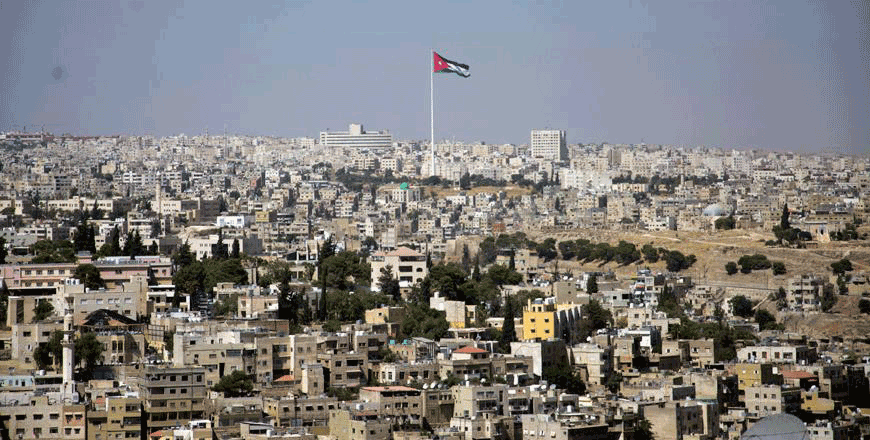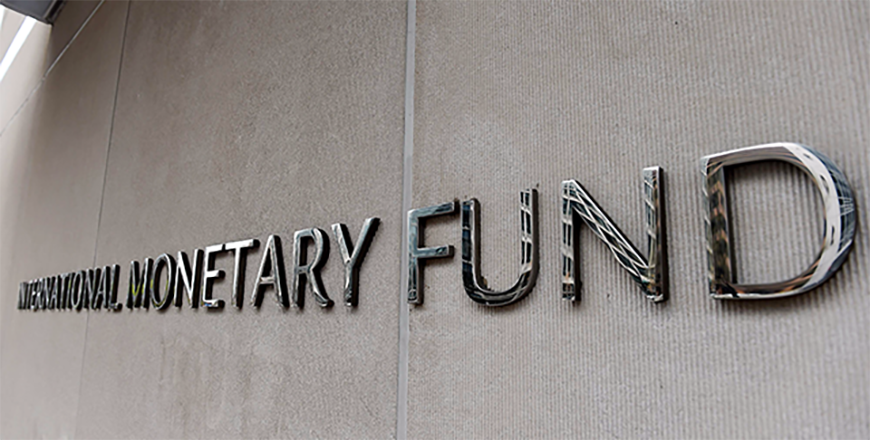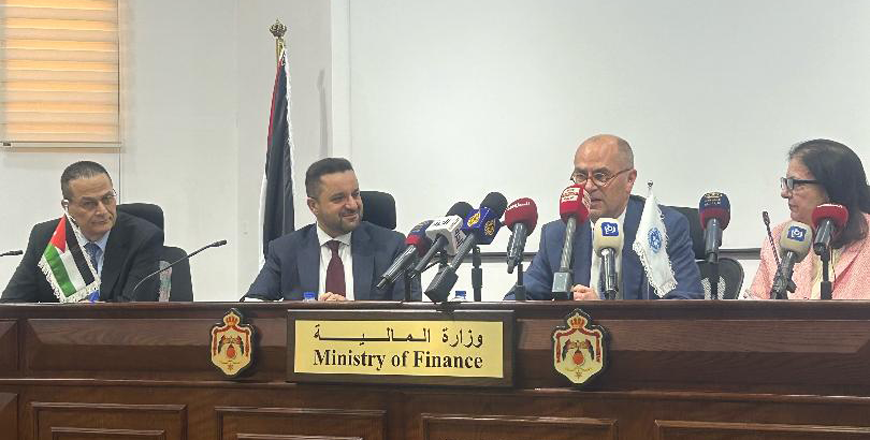You are here
IMF reach staff level agreement on second review with Jordan under Extended Fund Facility
By JT - Oct 12,2024 - Last updated at Oct 12,2024

International Monetary Fund (IMF) staff and the government reach a staff level agreement on the second review with Jordan under the Extended Fund Facility (JT file photo)
AMMAN — International Monetary Fund (IMF) staff and the government have reached a staff level agreement on the second review with Jordan under the Extended Fund Facility (EFF).
All commitments for the second review under the program have been met, demonstrating the authorities’ steadfast commitment to sound macro-economic policies and continued progress on reforms, according to an IMF statement.
Jordan continues to show resilience and maintain macro-economic stability, despite the headwinds caused by the intensifying conflict in the region.
The Kingdom's economy is expected to grow by 2.3 per cent in 2024 and 2.5 per cent in 2025. Yet, strong and timely international support remains important to help Jordan face the external headwinds, and to continue to shoulder the cost of hosting a large number of Syrian refugees.
Bringing the Jordanian economy onto a higher growth trajectory is essential to create more jobs and raise prosperity, said the statement.
This requires accelerating structural reforms, while maintaining macro-economic stability, and making significant progress in implementing the Kingdom's Economic Modernisation Vision.
A staff team from the IMF, led by Ron van Rooden, visited Amman during September 30–October 10, for discussions on the 2024 Article IV consultation and the second review under the arrangement under the IMF’s EFF, which was approved by the IMF’s Executive Board on January 10, 2024.
At the conclusion of the mission, van Rooden issued a statement, in which he said: “We are pleased to announce that the IMF team and the Jordanian authorities reached a staff-level agreement on the second review of the authorities’ economic reform programme supported by the EFF arrangement, approved in January of this year."
Programme performance continues to be strong, despite a challenging external environment. All quantitative performance criteria and structural benchmarks for the second review were met and steady progress is being made toward achieving the program’s overall objectives, including good progress toward meeting benchmarks for future reviews, he added.
The agreement is subject to approval by the IMF’s management and the Executive Board. The completion of this review will make another Special Drawing Rights (SDR) 97.784 million (about $131 million) available, out of the previously approved programme size of SDR 926.370 million (about US$1.2 billion), the IMF official said.
“Jordan continues to show resilience and maintain macro-economic stability, despite the headwinds caused by the intensifying conflict in the region. This resilience is the result of the authorities’ continued pursuit of sound macro-economic policies and reform progress," said van Rooden.
The recent upgrades to Jordan’s credit ratings, the first in over 20 years, testify to the credibility of the authorities’ economic policies.
“Nonetheless, as the conflict continues and widens, it is having a larger impact on Jordan’s economy than anticipated at the outset of the programme. The economy is projected to grow by 2.3 per cent this year, with weaker domestic demand offset by a stronger performance in net exports," he said.
Growth is projected at 2.5 per cent for 2025. Inflation remains low, at 2 per cent, thanks to the Central Bank of Jordan’s (CBJ) firm commitment to monetary stability and safeguarding the exchange rate peg.
The financial sector remains healthy and well capitalised, said van Rooden, adding that the current account deficit is projected to narrow to 4.4 per cent of GDP this year, helping to further build the CBJ’s reserve buffers, and to widen slightly to 4.7 per cent of GDP in 2025.
He said that the government revenues have been adversely affected this year by the weaker domestic demand, as well as a sharper-than-expected drop in the prices of key export commodities. The authorities have taken strong actions to offset the revenue shortfall to contain this year’s central government budget deficit.
"With this, the authorities are committed to limit this year’s central government primary deficit (excluding grants and transfers to public utilities) to 2.9 per cent of GDP, up slightly from 2.7 per cent of GDP in 2023," he added.
Together with measures taken to limit the operational losses of the utility companies and continued surpluses of the social security system, the overall general government primary deficit (excluding grants) is expected to remain broadly unchanged this year, at 1.3 per cent of GDP, compared to 1.4 per cent in 2023, and public debt to be contained at just over 90 per cent of GDP by end-2024, van Rooden said.
“The authorities are firmly committed to continue to implement sound macro-economic policies to maintain stability and to advance structural reforms needed to further strengthen the resilience of Jordan’s economy and to improve people’s living standards, as envisaged also in their Economic Modernization Vision."
Notably, fiscal policy aims to reduce public debt to 80 per cent of GDP by 2028 to ensure fiscal sustainability, by advancing a gradual fiscal consolidation, including limiting the central government primary deficit (excluding grants and transfers to the public utilities) to 2 per cent of GDP in 2025.
With further efforts to improve the finances of the public utilities and continued surpluses of the social security system, the overall general government primary deficit (excluding grants) will be reduced by 1.1 per cent of GDP to 0.2 per cent of GDP, he noted.
The CBJ’s monetary policy will continue to be underpinned by its firm commitment to the exchange rate peg to the US dollar and to maintain low inflation, and the CBJ stands ready to undertake policy adjustments as necessary to credibly safeguard monetary and financial stability, the IMF official pointed out.
“The authorities are determined to step up the pace of structural reforms to achieve stronger growth and generate more jobs, which is particularly important given that unemployment remains high, particularly among the youth and women," van Rooden said.
Reforms will focus on improving the business environment, to attract more investment, by enhancing competition and labor market flexibility, while further strengthening the social safety net. Efforts will also focus on streamlining regulation and digitalization of government services, including tax and customs administration.
“The staff team is grateful to the authorities for the candid and constructive discussions," he said.
The team met with Prime Minister Jafar Hassan, Minister of Finance Abdelhakim Shibli, Minister of Planning and International Cooperation Zeina Toukan, Minister of Economic Affairs Muhannad Shehadeh, Governor of the Central Bank of Jordan Adel Sharkas, and other ministers and senior government and CBJ officials.
Related Articles
AMMAN — An International Monetary Fund (IMF) mission led by Ron van Rooden visited Amman during May 3-17, 2023, to conduct the sixth review
AMMAN — The government and the Central Bank of Jordan, together with the International Monetary Fund (IMF) reached a staff-level agree
AMMAN — The Executive Board of the International Monetary Fund (IMF) completed the first review of Jordan’s programme supported by the Exten















